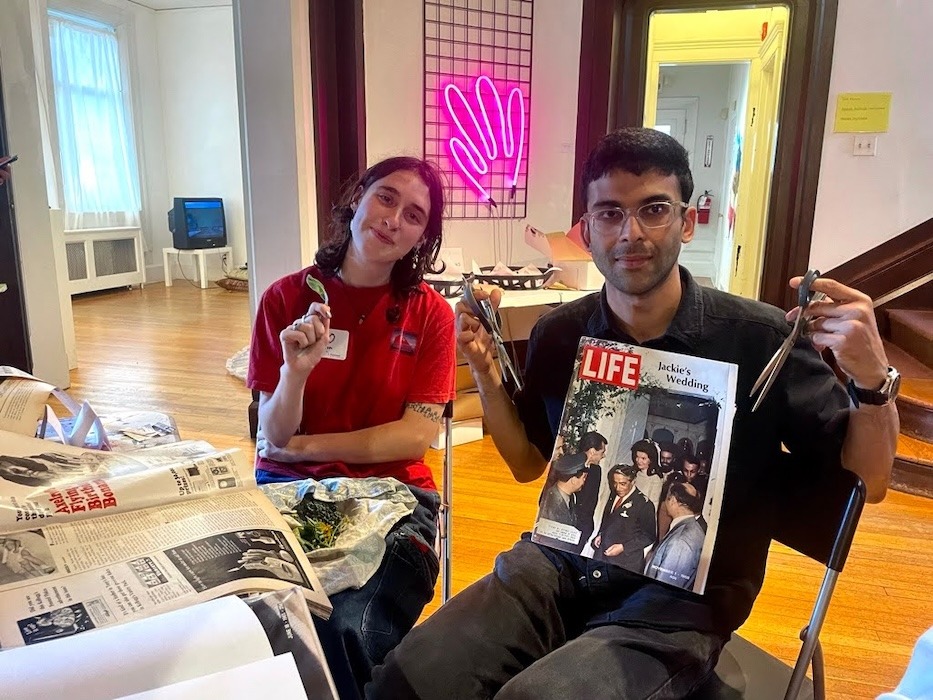
East Rock | Ely Center of Contemporary Art | Arts & Culture

Wentzel and De showing off their collage materials. Elena Unger Photos.
When Elio Wentzel was a child, they would make small, handmade books with their mother. They would spend hours selecting photos to print, writing captions, and carefully lacing the binding with a ribbon. Now, over a decade later, they are helping run zine workshops at New Haven’s Ely Center of Contemporary Art.
“I made a lot of zines through high school and coming into college,” Wentzel said. “I'm really passionate about making books and distributing work that way.”
Sunday, zines took center stage at the Ely Center, during the Ely Center of Contemporary Art’s (ECoCA) first photobook mini fair, a celebration of photobooks, zines, artists’ books and the creatives behind them. Amidst multiple artist talks, demonstrations and book signings, zines remained the star of the show.
A zine is a limited edition, self-published booklet that is usually handmade or photocopied. They can be used to share ideas that traverse the worlds of politics, history, art, and culture, explained Amartya De, a former artist in residence at the Ely Center.
De met Wentzel through a mutual friend, and the two quickly bonded over photography. Before long, they launched a shared mission to reopen Trumbull College’s darkroom at Yale. When the Ely Center staff asked De to run a zine workshop at the photobook mini fair, he knew just who to reach out to for help.

The photobook mini fair included a series of talks by photographers about upcoming books. While the talks took place in the back room of the art center, lit only by the sunlight that filtered through the half-shaded windows, the zine-making workshop was up and running in the center’s foyer.
De and Wentzel sat at a folding plastic table as patrons trickled in. Collage materials — including pictures from around New Haven, vintage copies of Life Magazine, and old newspapers—were splayed across the table’s surface, and the friends invited fair attendees to collage, chat, and engage with the zine as a legitimate artistic medium.
“These are, like, as valuable as any book in some ways,” De said, a zine folded between his palms.
Working as a photographer, De was immediately attracted to the subculture of photography zines, which he was initially exposed to in an art class. He produced his first zine just over a month ago, printing 100 copies, which he is slowly passing out to friends, community members, and even strangers.
De was able to fund the project thanks to El Rincón de Papel, a New Haven based collaborative for BIPOC creatives experimenting with paper-based forms. The group, helmed by artist Daniel “silencio” Ramirez, offers subsidized art supplies and printing, as well as community zine fairs and workshops.

Sophia DeLuca.
De expressed earnest gratitude for the grant he got from ERP, as printing is a key part of the zine process.
“Distribution is important. Because I think like the moment you make one zine, it's just like a maquette or a dummy for the future potential,” said De. “That's what differentiates it from an art object.”
In order to provide distribution potential to fair attendees, De and Wentzel had three printers stationed on a low wooden table against the gallery wall. After folding their zine, and collaging the pages, patrons had the chance to scan, copy, and print 50 copies of their work to distribute.
Sophia DeLuca, a Yale Global Health Fellow who discovered the Ely Center’s photobook fair while riding her bike down Trumbull Street, couldn’t help but stop by the zine-making table.
“I have been wanting to be more creative and tap into that part of my life, because it doesn’t always come out in school,” she shared.
She took a seat beside Wentzel, eagerly flipping through a 1968 copy of Life Magazine.
As the afternoon crept on, the table became increasingly crowded with people eager to cut magazine scraps and assemble something meaningful to them. Photobook fair attendees that had gathered in the back room of the art center for various artist talks eventually wandered into the foyer, intrigued by the display before them.
For Wentzel, leading the workshop was an opportunity to share the sense of community and camaraderie that zines evoke.
In their senior year of high school, Wentzel created a zine titled Queer Love Stories, containing the interviews and portraits of nearly 20 community members regarding aspects of their experiences with romance and identity in Port Townsend, Washington.
The experience opened their eyes to the power zines have to platform and illuminate forgotten stories. They also fell in love with the tactile experience of production.
“I find a lot of joy in how folding works, and how different layers of collage can come out, especially because most of the paper that you find in magazines is double sided,” said Wentzel. “You might cut out something on one side, not knowing what's on the other, and then find something that pops out to you that you want to bring together."

